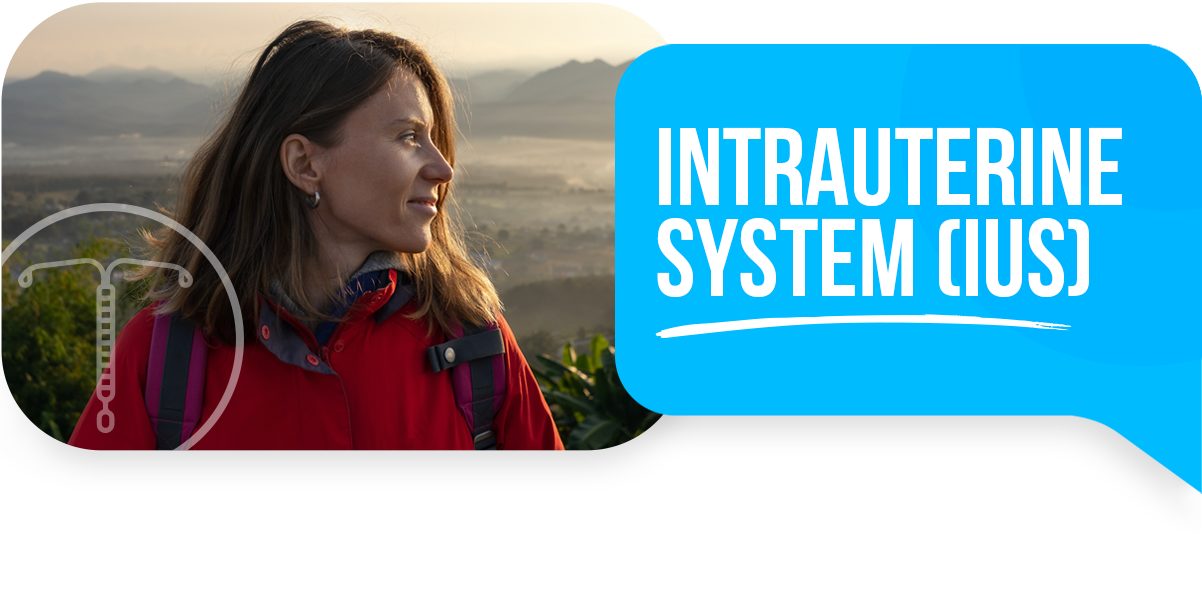PROS/CONS
Pros
Don’t need to remember to take/use it every day or every time you have sex.
Can’t forget to take it or use it in the wrong way. It is also not affected by vomiting or diarrhoea like some methods of contraception.
Is >99% effective at preventing pregnancy.
Some IUS can also be used to treat heavy menstrual bleeding (HMB) as they can make periods shorter and lighter, with some women experiencing no periods at all.
Upon discontinuation of use, fertility should return to normal.
Prevents pregnancy for up to 3-6 years, depending on the IUS.
Does not contain oestrogen but does contain progesterone.
With the IUS in place you don't need to worry about contraception in the moment.
Can be used while breastfeeding, six weeks after childbirth.
Cons
Irregular bleeding and spotting can be common in the first 3-6 months of use. Lighter and shorter periods then tend to follow and for some women periods may stop altogether.
Some women prefer hormone free options.
Does not protect against HIV infection (AIDS) and other sexually transmitted infections (STIs).
It may cause weight gain.
It may cause breast tenderness.
Can cause or worsen acne in some women.
It requires a trained healthcare provider to fit and remove the IUS.
The pros and cons listed are not exhaustive. Talk to your doctor or nurse for more information.
SIDE EFFECTS
IUS side effects
Different to the contraceptive pill or other forms of hormonal contraception (implant, injection, ring, patch), the hormones in the IUS are thought to act locally, which means they are concentrated in the womb, with lower levels of hormone in the blood.
This means the hormones may be less likely to cause negative symptoms, i.e mood changes, that may occur with other hormonal contraceptive methods.

An IUS will affect your periods. Irregular bleeding and spotting can be common in the first 3-6 months of use. However, lighter, and shorter periods then tend to follow and for some women periods may stop altogether. It is for this reason that the IUS can be used to treat heavy menstrual bleeding.
Because the IUS contains levonorgestrel, a progestin hormone, a small percentage of patients may experience weight gain.
Some women may experience weight gain whilst using the IUS. As the IUS contains a small amount of progestogen hormone, some people using an IUS may experience changes in mood.
IUS can cause or make certain skin conditions such as acne worse in some women. This is due to the hormone progestogen. Some forms of progestogen can stimulate androgenic activity in the body and cause overstimulation of the sebaceous glands. This can then cause oily skin, resulting in acne.
-
Decreased libido
-
Headache
-
Migraine
-
Dizziness
-
Abdominal pain
-
Nausea
-
Hirsutism (hair growth)
-
Pelvic pain
-
Dysmenorrhoea (period pain)
-
Vaginal discharge
-
Vulvovaginitis (inflammation of the vulva and vagina)
-
Breast tenderness
-
Breast pain
-
Pelvic infection - Small risk of infection during insertion.
-
Rejection - Risk of expulsion of the IUS.
-
Damage to the womb - It is rare, but the IUS can make a hole in the wall of the womb when it is put in. If it does happen, the IUS may have to be removed by surgery.
-
Ectopic pregnancy - Pregnancy outside the womb (ectopic pregnancy) is possible but very rare. If the IUS fails and you become pregnant, there's an increased risk of ectopic pregnancy.
-
Cysts - Can cause small fluid-filled cysts on your ovaries – these don’t usually cause any symptoms and tend to go away on their own.
PP-UN-WHC-GB-0149 January 2024




